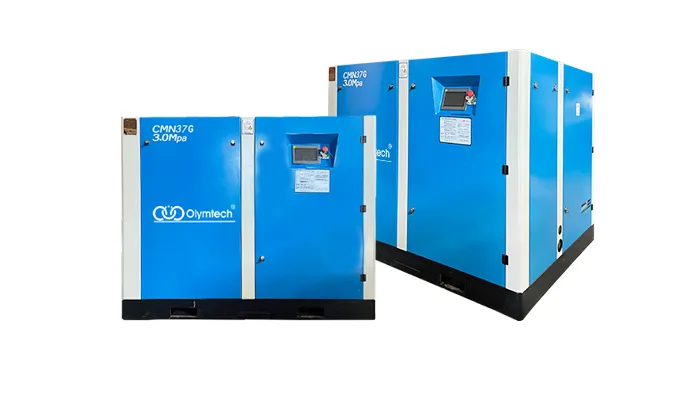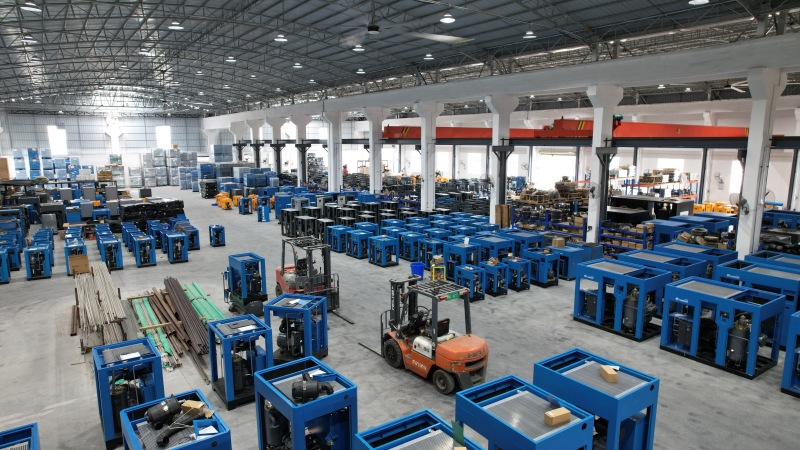News
Site Editor
 Site
/uploads/image/65596ff804643.png
Air compressors are the backbone of countless industries, powering tools, machinery, and automation systems. Among the various types, rotary screw air compressors have emerged as a top choice for businesses prioritizing efficiency, reliability, and quiet operation.
Site
/uploads/image/65596ff804643.png
Air compressors are the backbone of countless industries, powering tools, machinery, and automation systems. Among the various types, rotary screw air compressors have emerged as a top choice for businesses prioritizing efficiency, reliability, and quiet operation.
What is a Rotary Screw Air Compressor?
Views: 275
Author: Site Editor
Publish Time: 2025-02-19
Origin: Site
Air compressors are the backbone of countless industries, powering tools, machinery, and automation systems. Among the various types,
rotary screw air compressors have emerged as a top choice for businesses prioritizing efficiency, reliability, and quiet operation. But what exactly makes them stand out? In this guide, we’ll break down how rotary screw compressors work, their advantages over traditional models, and why they’re a smart investment for industries ranging from manufacturing to HVAC.

1. How Does a Rotary Screw Air Compressor Work?
At the heart of a rotary screw air compressor are two helical screws (rotors) that rotate in opposite directions. As these screws turn, they trap air between them and gradually reduce the volume of the air pocket, compressing it until it reaches the desired pressure. Here’s a simplified breakdown:
Intake: Ambient air enters through a filter.
Compression: The twin screws (male and female rotors) mesh together, compressing the air as it moves along the chamber.
Discharge: Compressed air exits into a storage tank or directly into the system.
Oil-Injected vs. Oil-Free Models:
Oil-injected: Uses oil to lubricate, cool, and seal the rotors. Ideal for heavy-duty applications.
Oil-free: Relies on coated rotors or timing gears, perfect for sensitive industries like food processing.
2. Rotary Screw vs. Reciprocating Compressors: Key Differences
While reciprocating (piston) compressors are common, rotary screw models dominate in industrial settings. Here’s why:
|
Feature
|
Rotary Screw
|
Reciprocating
|
|
Efficiency
|
30%+ energy savings
|
Less efficient at high workloads
|
|
Noise Level
|
70–75 dB (quieter)
|
85–90 dB (louder)
|
|
Maintenance
|
Minimal (no valves or pistons)
|
Frequent part replacements
|
|
Lifespan
|
60,000–100,000 hours
|
10,000–30,000 hours
|
Best Use Cases:
Rotary screw: Factories, hospitals, HVAC systems (continuous operation).
Reciprocating: Small workshops, intermittent tasks (e.g., inflating tires).
3. Top 5 Benefits of Using a Rotary Screw Air Compressor
Energy Efficiency:
Variable Speed Drive (VSD) models adjust motor speed to match demand, cutting energy use by up to 35%.
Durability:
Fewer moving parts mean less wear and tear. Expect 10+ years of service with proper care.
Low Noise:
Enclosed designs and smooth operation reduce noise, complying with workplace safety standards.
Continuous Operation:
No risk of overheating, even during 24/7 shifts.
Reduced Maintenance:
No piston replacements or valve adjustments—just routine oil changes (for oil-injected models) and filter checks.
4. Common Applications of Rotary Screw Air Compressors
These compressors are versatile powerhouses in industries like:
Manufacturing:
Powering CNC machines, robotic arms, and assembly lines.
HVAC:
Operating large-scale heating/cooling systems in commercial buildings.
Food & Beverage:
Oil-free models ensure contamination-free air for packaging and bottling.
Construction:
Running pneumatic tools (e.g., jackhammers) at remote sites.
Pharmaceuticals:
Meeting strict air purity standards for drug production.
5. How to Maintain Your Rotary Screw Air Compressor for Longevity
Follow these steps to maximize your compressor’s lifespan:
Daily Checks:
Monitor oil levels (for oil-injected units) and inspect for leaks.
Weekly Tasks:
Clean air filters and check belt tension.
Monthly Maintenance:
Drain condensate from air tanks and test safety valves.
Annual Servicing:
Replace oil, filters, and seals; inspect rotors for wear.
Conclusion
Rotary screw air compressors offer unmatched efficiency, reliability, and versatility for industrial and commercial applications. Whether you’re upgrading outdated equipment or investing in your first compressor, understanding their benefits and maintenance needs ensures a smart, long-term decision. For personalized advice, consult an air systems specialist or explore our guide to “
Choosing the Right Air Compressor for Your Business.”
